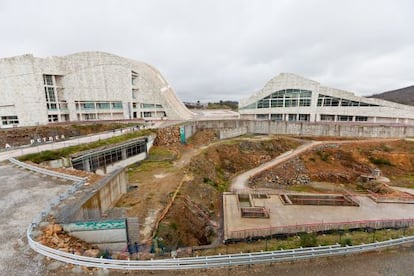Compostela’s City of Culture to be left unfinished
Galician government calls a definitive halt to work on multi-million-euro prestige project

After twelve years and at a cost of 287 million euros, the regional government of Galicia has decided to end work on its controversial City of Culture, settling for four of the originally planned six buildings on a sprawling complex on a hillside dominating the cathedral city of Santiago de Compostela.
The project was launched in the boom days of 2001 by the then head of the regional governor of Galicia, Manuel Fraga of the Popular Party (PP). Not to be outdone by Bilbao, which had hired Frank Gehry to build the Guggenheim — opened three years before to international acclaim — Fraga, a minister in Franco's regime, brought in US architect Peter Eisenman, best known in Europe for his Holocaust Memorial in Berlin.
The cost of building the 650,000-square-meter City of Culture on Monte Gaiás was originally budgeted at 108 million euros, but soon soared, and by 2005, when a Socialist-nationalist coalition took over from Fraga, work slowed.
In January 2011, when the PP took control of Galicia again, this time under Alberto Núñez Feijóo, two of the buildings, the library and the archive, were opened. But there was still no clear plan as to the purpose of the stone buildings set amid spacious avenues and squares. Since then, two more have opened, the museum and the main services building. The theater and international arts center will not now be completed. The Galician regional government temporarily stopped work on them in 2006, then again 2007, and once more in 2011.
Agreement had been reached with the construction companies involved to begin work again in 2014. But with the Spanish economy showing no sign of improvement, Feijóo last week ordered his deputies in the regional government to support a motion by the BNG to "definitively" stop work. The Socialist Party, wrong-footed by the surprise move, abstained in the vote, pointing out that contracts signed in 2005 will still mean having to pay 18 million to the construction companies.
The regional government has not confirmed the exact amount that would have to be paid in compensation to the construction firms, but says that any figure would be lower than the estimated 170 million required to finish the job.
For the moment, Galicia's flagship cultural project is little more than four large empty buildings and two big holes in the ground. What to do with the foundations of the two buildings that will not be built is yet to be decided, and it is unlikely that the others will see much use. But other questions remain.
The first is the whether the cost of running the complex can be sustained. Maintenance — cleaning, security and utilities — comes to four million euros a year. Staging events costs another 4.5 million euros. The complex has not proved much of an attraction in a city that receives tens of thousands of pilgrims ending their walk along the Camino de Santiago, nor with locals. An exhibition on the history of stone in Galician building cost more than one million euros, and in six months brought in just 50,000 euros. Last year, 330,000 people visited the site. During the same period in Bilbao, more than one million people visited the Guggenheim. The regional government nevertheless defends the cost of the complex, saying that it is a question of prestige and projecting an image of Galicia internationally.
Tu suscripción se está usando en otro dispositivo
¿Quieres añadir otro usuario a tu suscripción?
Si continúas leyendo en este dispositivo, no se podrá leer en el otro.
FlechaTu suscripción se está usando en otro dispositivo y solo puedes acceder a EL PAÍS desde un dispositivo a la vez.
Si quieres compartir tu cuenta, cambia tu suscripción a la modalidad Premium, así podrás añadir otro usuario. Cada uno accederá con su propia cuenta de email, lo que os permitirá personalizar vuestra experiencia en EL PAÍS.
¿Tienes una suscripción de empresa? Accede aquí para contratar más cuentas.
En el caso de no saber quién está usando tu cuenta, te recomendamos cambiar tu contraseña aquí.
Si decides continuar compartiendo tu cuenta, este mensaje se mostrará en tu dispositivo y en el de la otra persona que está usando tu cuenta de forma indefinida, afectando a tu experiencia de lectura. Puedes consultar aquí los términos y condiciones de la suscripción digital.








































